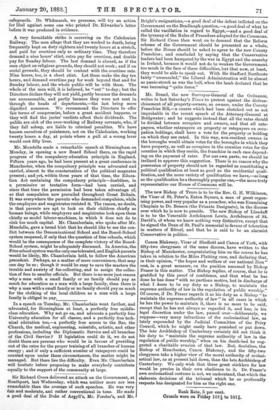Mr. Mundella made a remarkable speech at Birmingham on Monday,
in opening a new Board School there, on the rapid progress of the compulsory-education principle in England. Fifteen years ago, he had been present at a great conference in Blanchester, when the compulsory principle was advocated and -carried, almost to the consternation of the political magnates present; and yet, within three years of that time, the Educa- tion Act containing the compulsory principle—doubtless, in a permissive or tentative form—had been carried, and since that time the permission had been taken advantage of, so that compulsion now prevailed throughout Great Britain. It was everywhere the parents who demanded compulsion, while -the employers and magistrates resisted it. The reason, no doubt, is that parents are apt to look on their children chiefly as 'human beings, while employers and magistrates look upon them -chiefly as model labour-machines, in which it does not do to sink too much capital. Mr. Chamberlain, who spoke after Mr. Mundella, gave abroad hint that he should like to see the con- flict between the Denominational School and the Board-School system reopened, if only that the question of free schools, which would be the consequence of the complete victory of the Boar& School system, might be adequately discussed. In America, the Free-school system was the only one tolerated, and English parents -would be likely, Mr. Chamberlain held, to follow the American precedent. Perhaps, as a matter of mere convenience, that may -one day be so; though it would be easy to save the masters the trouble and anxiety of fee-collecting, and to assign the collec- tion of fees to smaller officials. But there is no more just reason -why a man with a small family or no family should pay as much for education as a man with a large family, than there is why a man with a small family or no family should pay as much for the clothing of the local children as a man with a large family is obliged to pay.


































 Previous page
Previous page